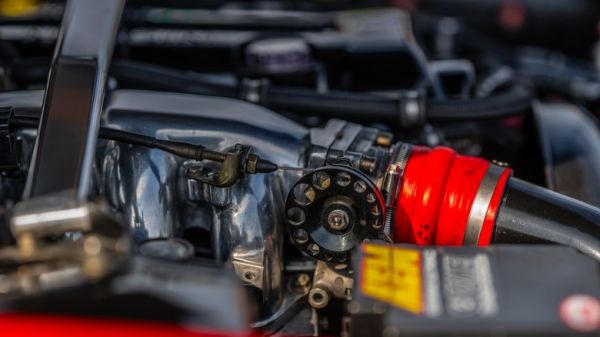The BMW S65 was an extremely popular engine that powered the M3 from 2007-2013. In that time, it won the International Engine and Powertrain of the Year Award for Best 3-liter to 4-liter Engine five years in a row, from 2008 to 2012. It isn’t hard to see why, either. The S65 was a 4-liter V8 that produced more power than any engine the company had used in the M3 before. It wasn’t necessarily the most powerful engine BMW ever built, but it was able to generate 414 horsepower at 8,300 RPM and 295 lb-ft of torque at 3,900 rpm. This turned the sleek M3 into a performance powerhouse that had plenty of get-up-and-go, handled well, and was a beast in the straightaways. Motor trend tested the 2012 model and found that the car was able to go from 0-60 MPH in just 4.1 seconds.
Advertisement
That said, the S65’s legacy isn’t entirely golden. There are plenty of critics out there who prefer the turbocharged inline-six engines that BMW used in the M3 models that came before and after those fitted with the S65. But performance preferences aside, the last iteration of this engine is now over a decade old. Folks who find one of the ’07-’13 M3s for sale now might have some questions about its reliability, since most of the models on the market are starting to get up there in mileage. Reliability can be a difficult metric to measure, and one of the best ways to learn about how a car holds up is to see what owners have to say about it. BMW has made some very reliable cars in its time, but it seems the S65 M3 probably shouldn’t be counted among them.
Advertisement
Reports vary on the S65 reliability
There are a lot of varying reports on the reliability of the BMW S65 engine and the M3 as a whole. User reviews on cars.com give the 2012 M3 an outstanding weighted score of 4.8 out of five overall, but its reliability score is only 4.4–tying reliability with value as the lowest scoring metrics measured for the car. The reviews on Edmunds tell a similar, but even more concerning, story regarding the 2010 model. Its customer review scale also lists a 4.8 out of five for the car overall, but Edmonds cites a RepairPal rating score of 2.5 out of five for reliability.
Advertisement
It’s worth noting that many of the repairs that have caused this rating to be so low aren’t associated with the S65 engine. There have been several reported issues with the ignition, water pump, brakes, oil leaks and various other components as well. “This car is fun to drive (naturally aspirated V8 sound!) but is absolutely atrocious in terms of built quality and maintenance,” wrote one reviewer on Kelly Blue Book who listed several technological and expensive mechanical repairs that needed to be addressed. This sentiment seems to be echoed across several of the reviews posted on other sites as well.
Common problems reported by owners
So what are these issues that cause the M3 to score so low in reliability, and are they to the S65? It seems that, while many of the car’s issues are to its computer system and various other mechanical issues, the engine has played a role in the car’s low-reliability scores as well. “I love, love, loved driving this refined beast!” wrote one of the reviewers on cars.com. “The sound of the V8 at 8,000rpm was music! The handling superb! Then, reality hit- common issues included lower rod bearings, motor mounts, clutch, brake rotors, throttle, [and] actuators, all cost many [thousands of dollars] each! A very high-maintenance sweetheart. If you wanna play, you must pay!”
Advertisement
One of the earliest issues that started to crop up was the connecting rod bearings wearing out prematurely due to a lack of clearance between them. Some have suggested that they should be replaced before the car hits the 65,000-mile mark. The throttle body actuator presented a major problem as well due to the plastic gears BMW used inside the actuator mechanism. On top of these issues within the engine itself, it seems that it’s also quite common for ’07-’13 M3 owners to need to replace the engine mount. Each of these are repairs that typically cost hundreds or even thousands of dollars to perform.
Reliability often depends on the owner
So, now you might be wondering why the BMW S65 M3 doesn’t score even lower in reliability if these problems are so prevalent. Well, the answer might come down to the driving habits, care, and maintenance of the car on the part of the owner. There are plenty of jokes out there about a ’96 Toyota Corolla being able to run with mud in the oil pan and Monster Energy drink in the fuel tank, but most cars are a bit more particular about their maintenance schedules. Likewise, driving habits can have a serious impact on wear and tear. The S65 is a powerful engine, and so there will be many drivers who might be tempted to push its capabilities into the redline.
Advertisement
Several S65 M3 owners swear that regularly scheduled maintenance and following the manufacturer’s guidelines for oil changes will mitigate most of the listed mechanical issues from occurring. Proper lubrication will certainly help the connecting rod bearings last longer, but it’s hard to say if it will eliminate the problem entirely. “There are many concerns,” wrote one S65 M3 owner on Reddit. “The first being the vehicle’s maintenance history. You are shopping the owner as much as the vehicle. 5k oil changes are a must. In addition, I would expect plugs and all fluids to be changed every 30k miles and never less than every 50k. If not, tread with caution.”











